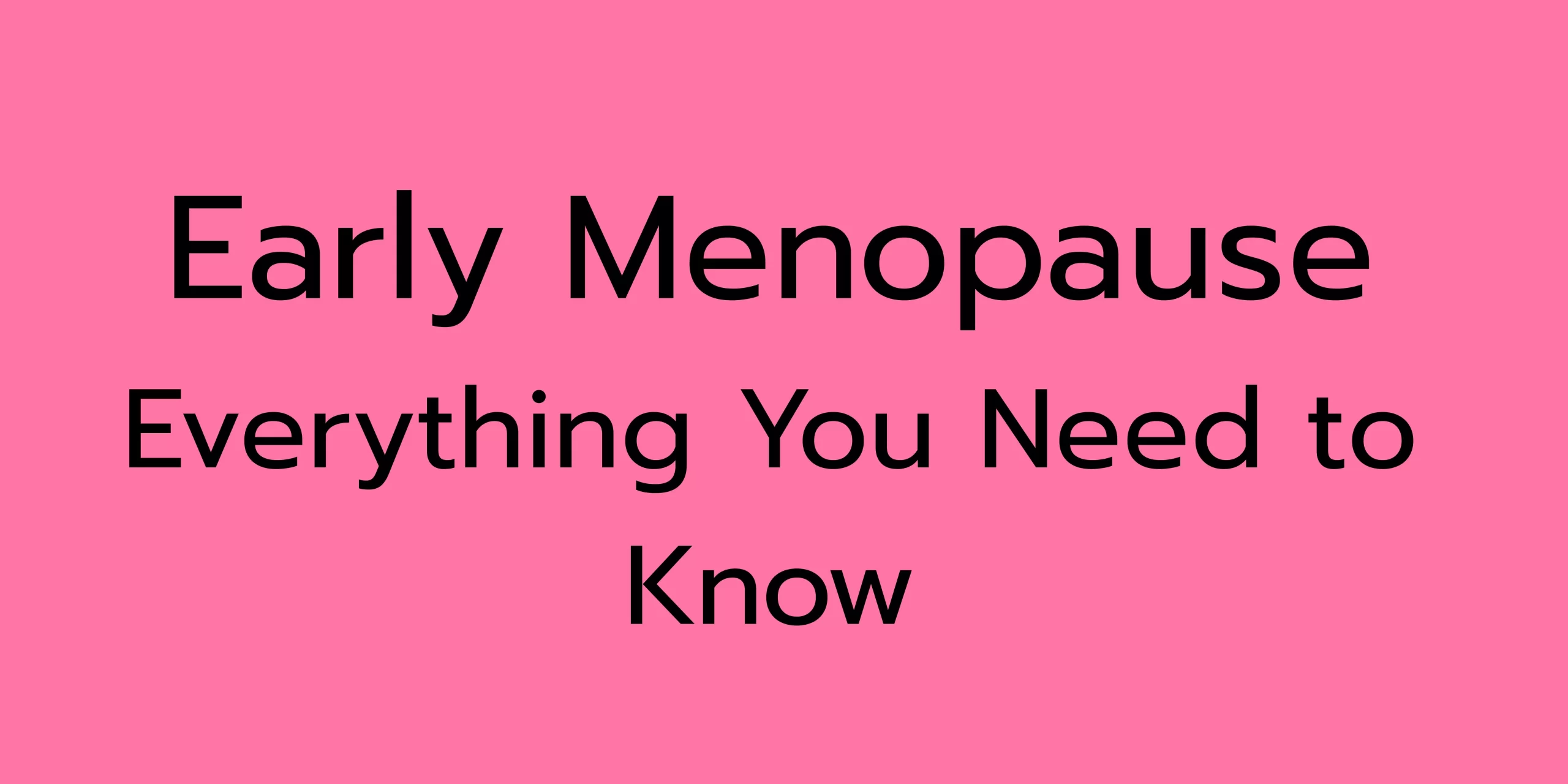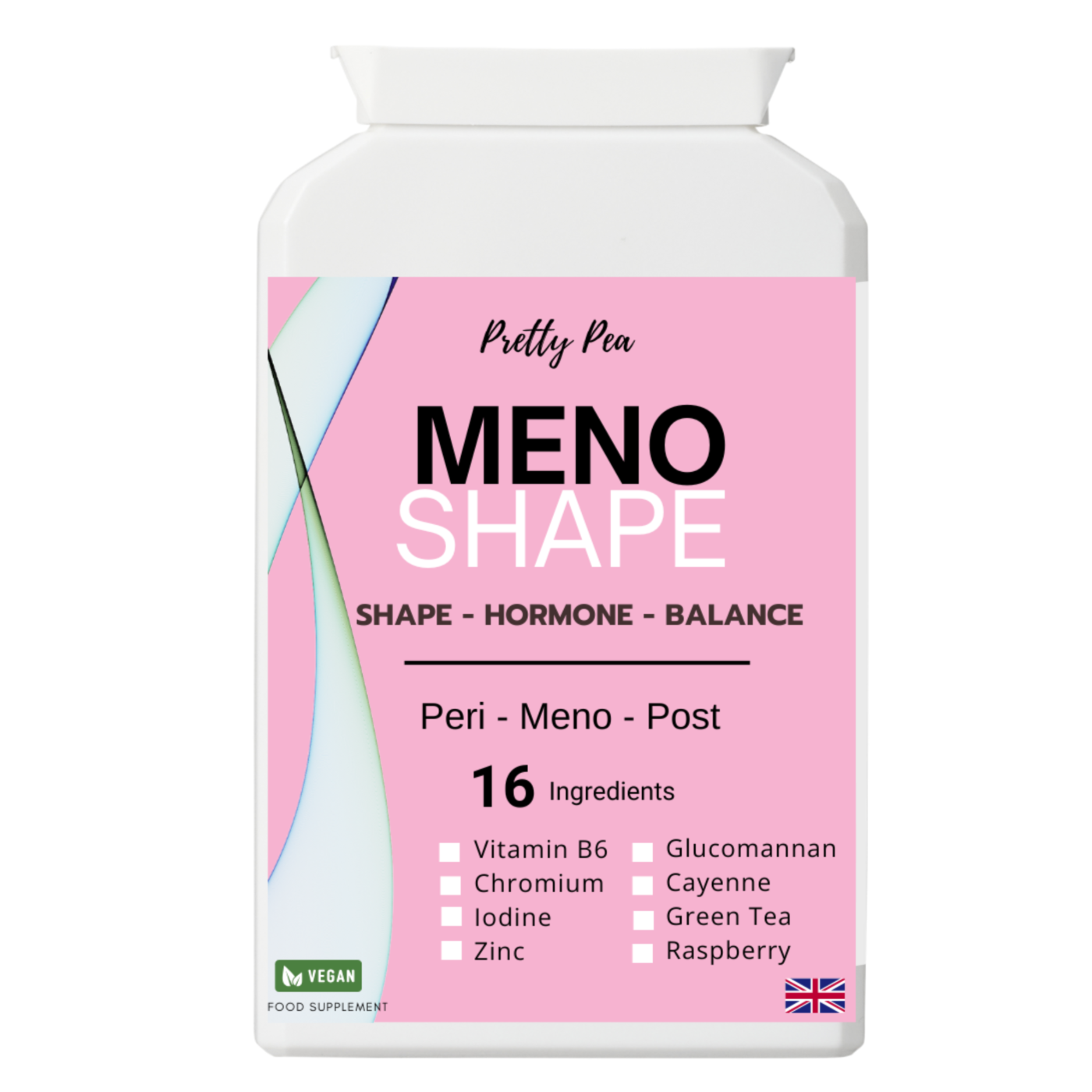Understanding Early Menopause Symptoms: A Comprehensive Guide for Women
Menopause creeps up on many women. Talking from personal experience it doesn’t usually come with an announcement, nor a schedule of what to expect and when, and what took me most by surprise was that early menopause symptoms can happen much earlier than expected. Contrary to common beliefs, menopause symptoms can begin well before age 50. Symptoms usually appear without warning pretty early during the menopausal transition and for some women these symptoms can start well before any menstrual changes are noticed – continuing well beyond the final menstrual period.
My own menopause journey taught me hard and fast that early menopause symptoms and the hormonal changes it brings can be both abrupt and severe. This guide aims to provide women with detailed information about early menopause, what it is, when it happens, the signs of early menopause, how common early menopause symptoms are, the causes, and offers current evidence on early menopause symptoms with strategies for women on how to manage early menopause.
What is Early Menopause
Menopause is a natural biological process marking the end of a woman’s reproductive years – and refers to the time where a women has had no menstrual period for 12 consecutive months. So menopause is pretty much just a day, and it typically occurs between the ages of 45 and 55, with the average age being 51.
Some women (like myself) experience menopause earlier, either as early menopause (between ages 40 – 44) or premature menopause before age 40 (also known as primary ovarian insufficiency (POI).
Both these conditions involve a decline in ovarian function, resulting in reduced hormone levels such as estrogen and progesterone – hormones which are essential for regulating the menstrual cycle and maintaining various bodily functions.
How Common is Premature and Early Menopause
2024 research states that there are around 1.1 billion postmenopausal women worldwide. But what about the women who hit menopause early?
Early menopause is experienced by around 8% of women in the UK, while premature menopause affects about 2% of women under the age of 40.
Whilst they are relatively uncommon, speaking from first hand experience, early menopause symptoms are a significant condition for some women as it can cause abrupt and severe symptoms.
Premature and Early Menopause Causes
Not every cause of early menopause will be identified. There are, however several factors that can contribute to the onset of premature or early menopause symptoms:
Genetic Factors: A family history of early menopause can increase the likelihood of experiencing it.
Premenstrual disorders (PMDs): Studies have linked recurring PMD symptoms before menstruation to increased risks of early menopause and moderate or severe vasomotor symptoms VMS (hot flushes/night sweats).
Premenstrual syndrome (PMS) is a milder form and affects 20% – 30% women of reproductive age. Premenstrual dysphoric disorder (PMDD), though less common than PMS, is dominated by affective symptoms and can severely affect quality of life.
Lifestyle Factors: Smoking has been associated with an earlier onset of menopause.
A recent 2025 study published in the International Journal of Obstetrics & Gynaecology associated smoking with a higher risk of early menopause. The study of 139,869 women found that daily cigarette consumption was a causal factor in early menopause and women with over 30 pack-years of smoking had around 1.5 times higher risk of early menopause.
Autoimmune Disorders: Conditions such as thyroid or rheumatoid arthritis can lead to the immune system attacking ovarian tissue, resulting in decreased ovarian function.
Surgery/Treatments: Chemotherapy and radiation therapy can damage the ovaries, leading to early menopause. Additionally, surgical removal of the ovaries (oophorectomy) induces immediate menopause.
Infections: Although rare, certain viral infections can lead to ovarian failure.
Early Menopause Symptoms
4 out of 5 women experience psychological or physical symptoms around menopause in both varying degrees of severity and disruption.
The premature and early menopause symptoms are similar to those experienced during typical menopause but may be more pronounced due to the more abrupt decline in hormone levels.
Clinicians and women normally identify the transition to menopause by the onset of irregular menstrual cycles, or by the start of vasomotor symptoms (otherwise known as hot flushes) – common menopause symptoms.
However, not every woman will experience the same early menopause symptoms. In addition to the more easily identified symptoms of hot flushes and period irregularities women can experience other pretty common menopausal symptoms, such as mood changes, fatigue and sleep difficulties – but without noticing any menstrual changes.
Or it could just be a case of knowing something’s amiss with your body – where you know something is different, as nobody knows your body better than you.
Some symptoms are only linked to menopause in hindsight when connecting the dots backwards. So here’s what to look out for:
Common early menopause symptoms include:
Vasomotor Symptoms: Hot flashes and/or night sweats affect approximately 80% of women during the menopausal transition.
Symptoms involve the sudden sensation of extreme heat in the upper body, particularly the face, neck, and chest and referred to as a “hot flush.”
Flushing, chills, clamminess, sweating, anxiety, and occasionally palpitations can occur lasting for around 1 – 5 minutes. Episodes can vary in both frequency and duration and can include night sweats.
Some studies have shown that up to 87% of women experience hot flushes daily, with one-third experiencing over 10 episodes per day.
Menstrual Irregularities: Changes in the frequency, duration, or flow of menstrual periods.
Genitourinary symptoms: More than 50% of women experience genitourinary symptoms (genitourinary syndrome of menopause [GSM]). Decreased estrogen levels can lead to thinning and drying of tissues, causing discomfort.
Mood Changes: Increased risk of anxiety, depression, irritability, and mood and emotional swings.
Sleep Disturbances: Disrupted sleep patterns can affect quality of life.
Cognitive Changes: Difficulties with concentration and memory, often referred to as “brain fog.”
Decreased Energy: Fatigue in both life and the bedroom.
Health Implications of Early Menopause
In the short-term early menopause symptoms can cause physical and psychological distress.
Whether early menopause affects long-term health, however, is uncertain.
It’s been proposed early menopause is a risk factor for adverse outcomes such as cardiovascular disease and osteoporosis, however early menopause may also reduce the risk of breast cancer, more studies are needed.
Estrogen has several protective effects in the body, so experiencing early menopause may lead to health implications due to prolonged exposure to low levels of estrogen:
Cardiovascular Health: Estrogen has a protective effect on the heart. Early menopause may increase the risk of cardiovascular diseases, including heart attacks and strokes.
Bone Health: Estrogen is crucial for maintaining bone density. Women with early menopause are at a higher risk of osteoporosis and fractures.
Neurological Health: There is an increased risk of neurological diseases, including cognitive decline and dementia.
Infertility: Early menopause results in the loss of fertility, which can be distressing for women desiring children.
Diagnosis of Premature and Early Menopause
Diagnosing early menopause can involve a combination of clinical evaluation and laboratory tests:
Medical History and Physical Examination: Assessment of symptoms, life events and menstrual history. Any significant stress, physical or emotional, can play a role.
Blood Tests: Measurement of hormone levels, particularly elevated follicle-stimulating hormone (FSH) and luteinizing hormone (LH), alongside decreased estrogen levels, can indicate ovarian insufficiency.
How to Manage Early Menopause Symptoms
Managing early menopause is about alleviating symptoms and mitigating long-term health risks:
Hormone Replacement Therapy (HRT): Your G.P. is your first contact as HRT is typically the primary treatment to relieve menopausal symptoms and prevent bone loss. It involves administering estrogen, with or without progesterone, depending on whether the woman has an intact uterus.
Non-Hormonal Therapies: For women who cannot or choose not to take HRT, non-hormonal medications such as selective serotonin reuptake inhibitors (SSRIs) or certain natural supplements such as isoflavones may help manage vasomotor symptoms.
Lifestyle Modifications: Regular physical activity, a balanced diet rich in calcium and vitamin D, and avoiding smoking can improve overall health and reduce the risk of osteoporosis and cardiovascular diseases.
Bone Health Management: Calcium and vitamin D supplements, along with weight-bearing exercises, are crucial for maintaining bone density.
Cardiovascular Health Monitoring: Regular monitoring of blood pressure, cholesterol levels, and relevant lifestyle changes are crucial to manage cardiovascular risk factors.
Mental Health Support: Counselling or support groups can help address the emotional impact of early menopause symptoms, including feelings of loss, anxiety, or depression.
Early Menopause Supplements: In addition to conventional treatments, certain supplements may help alleviate menopausal symptoms. However, it’s always essential to consult a healthcare professional before starting any new supplement regime, as interactions with medications or underlying health conditions can occur.
Meno Shape
MENO SHAPE Formulated for your Ever Evolving Body. Shape from the inside out, nutrition support during perimenopause, menopause & beyond with fibre fill Glucomannan
References
- British Menopause Society. (2023). What is the menopause? Retrieved from https://thebms.org.uk
- National Institute for Health and Care Excellence (NICE). (2023). Menopause: Background Information – Prevalence. Retrieved from https://cks.nice.org.uk
- NHS Inform Scotland. (2023). Early and Premature Menopause. Retrieved from https://www.nhsinform.scot
- House of Commons Library. (2021). Menopause and the Workplace. Retrieved from https://commonslibrary.parliament.uk
- The Lancet. (2023). Impact of Early Menopause on Cardiovascular and Neurological Health. Retrieved from https://www.thelancet.com
- NHS. (2023). Calcium and Vitamin D: Healthy Bones. Retrieved from https://www.nhs.uk
- British Dietetic Association. (2023). Nutrition and Menopause. Retrieved from https://www.bda.uk.com
- National Center for Complementary and Integrative Health (NCCIH). (2023). Herbal Supplements for Menopause. Retrieved from https://www.nccih.nih.gov
- Early menopause – NCBI Bookshelf
- Smoking, Genetic Susceptibility and Early Menopause: Unveiling Biological Mechanisms and Potential Therapy Targets – Liang – 2025 – BJOG: An International Journal of Obstetrics & Gynaecology – Wiley Online Library


